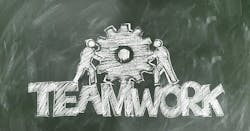The Fixer: The Key to Building a Team You Can Trust
How’s your day going? I bet I know the first word that comes to mind: busy.
Isn’t that always the go-to response? Don’t worry; I’m not judging here. I literally just gave the same answer to someone a moment before writing this. We all have a lot going on. Right now, my family and I are moving into a new house (which, obviously, means selling the original one, finalizing last-minute fixes and work on the new one, packing and unpacking—and all those other fun things you often forget until the last minute). I’m also setting up my next meeting for my group of shops that I coach. And there’s that whole operating-six-shops thing, right?
I get it: You’re busy. We’re all busy, which is great … but an issue all at the same time.
So, here’s the question I get all the time: When caught in the fray of our crazy lives, how do we manage our time? How do we prioritize and drive to push forward? Because, despite how busy we may feel (or actually are), it’s never an excuse for not improving our businesses or our lives.
In my first column, I spoke about the feeling of overwhelm that plagues many of us and makes it seemingly impossible to reverse a negative trend. Hopefully, that column helped you catch your breath and start thinking in a way that will position you to move forward.
Now, let’s move forward.
I’ll let you in on a not-so-secret secret here; it’s the reason I’m able to juggle the many things I do and still see my shops improve and grow each year—heck, each month, week and even day. Here’s the secret: It’s not because of me. My business is successful because of the people around me. I am able to manage my time because of the people around me. I am able to take on new projects, travel, open new facilities, etc., because of the people around me.
The key to success is having a talented, loyal team that shares your vision and will do what it takes to carry that vision out.
I get it, though; that’s a whole lot easier said than done—or at least, that’s the perception. I’ll be the first to say how fortunate I am to have the people around me that I do. And I’ll be the first to point out that you can put yourself in the same position.
It starts with recruiting. First and foremost, you need to hire quality people who are like yourself—motivated, passionate people who are dedicated to self-improvement. (That’s a big hint right there: You need to be dedicated to improving yourself if you ever want your team to be the same way. Personal development and improvement starts with you, but that’s a topic for another day.)
Finding our own ideal candidate comes down to both personality and talent. I want people that I want to work with, and that I want to hang out with. A good rule of thumb: Look for people you would want to have a beer with. It’s a great way to look at it—and I don’t even drink. The second part, obviously, is talent and skill level. That varies more depending on the job you’re hiring for, but you can get that out of people in the interviewing process. Look for red flags. Whether or not they blame other people or blame themselves tells me their level of responsibility and ambition. Whether or not they’re well spoken gives me an idea of education level. Depending on how relaxed they are, whether they’re nervous, whether they shake my hand, whether they take in the room when they come in—all of that can tell me how socially smart they are and how they can adapt to pressure. Look for cues.
In my company, I still directly hire all of my managers. My managers then do the hiring for their shops. Usually, we stick to a simple process: résumés, phone interview, in-person interview, then offer. If you ask the right questions and are alert to what you’re looking for, you don’t need to do more than that.
The second step is to pursue loyalty at all costs. By that, I mean costs to you, not the team. Let’s get this straight: Too many business owners blow through talented people because they don’t know how to make people loyal to them, and that’s because they don’t know how to be truly loyal to their teams. How do you develop loyalty? First off, you can’t be afraid to pay people what they’re worth. It can be difficult to offer up what you perceive to be a large salary, but I can assure you that it costs you far more to have the wrong people on your team. If you have more time than you have money, right now, you reward them with time until the business improves to the point you can pay them more. You can offer time off, you can spend more one-on-one time mentoring and training, invite them for barbecues—there are a lot of things you can do to show you care. People don’t care how much you know until they know how much you care. That’s the bottom line.
These are all things that didn’t come to me overnight. I’ve had to learn it and go through some trial and error (and plenty of mistakes). But the sooner you learn it, the sooner you build a team that not only makes your business more efficient and more profitable, but it also gives you the peace of mind that when times are hectic and your life is busy, your business will still push forward.
About the Author

Aaron Stokes
A nearly 20-year veteran of the automotive repair industry, Aaron Stokes grew his business, AutoFix, from a one-car garage to a six-shop operation that is widely regarded as one of the top repair businesses in the country. Stokes, the founder of Shop Fix Academy, is an operational guru with a unique business and leadership philosophy that has led his business to great heights.
